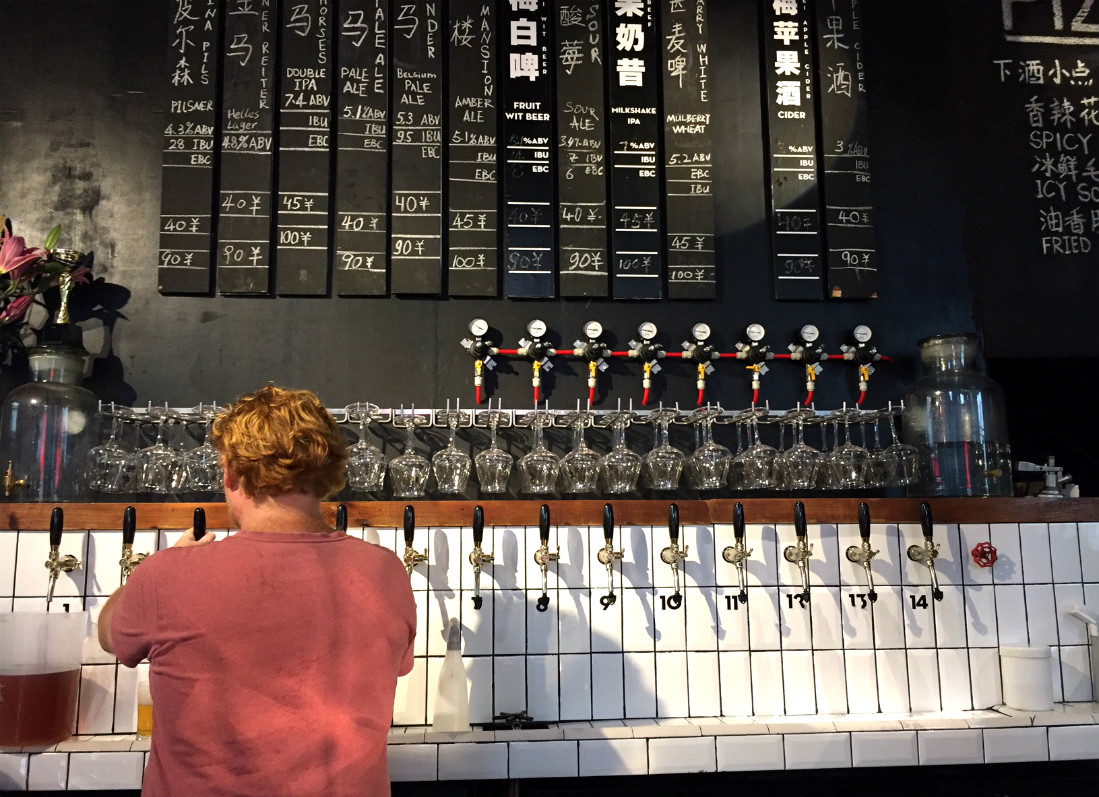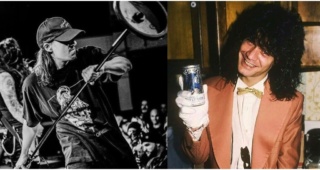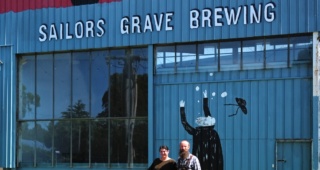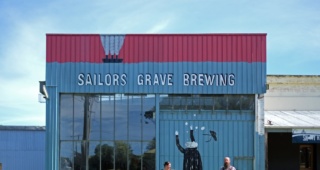Traffic isn’t moving on Yanwu Bridge at the Yanwu Road exit, again, and it’s all one man’s fault. “This mess exists around here because we made the Fujian political leaders drunk,” chuckles David Krings.
The mess to which Fat Fat Beer Horse’s founder refers is Sha Po Wei and its main artery, Daxue Road, which at the moment is less a road than a farcical pit swarming with excavators, bulldozers, dump trucks, and men wielding jackhammers. It has resembled the First Circle of Hell for years now.
One of these days, however, The Inglorious Gutting of Daxue just might reach its heavenly conclusion, and all the cute patisseries, tea cafes, and trendy fashion boutiques around here will ascend with joy from the debilitating shackles of a laborious construction project that has surely crippled business.

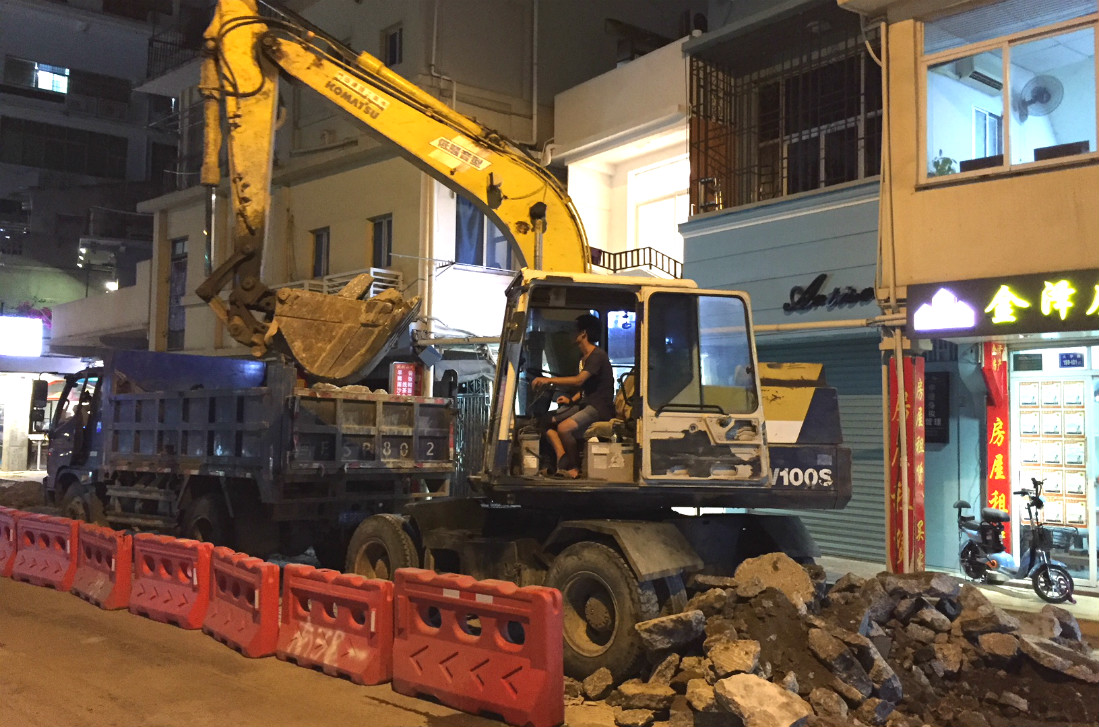
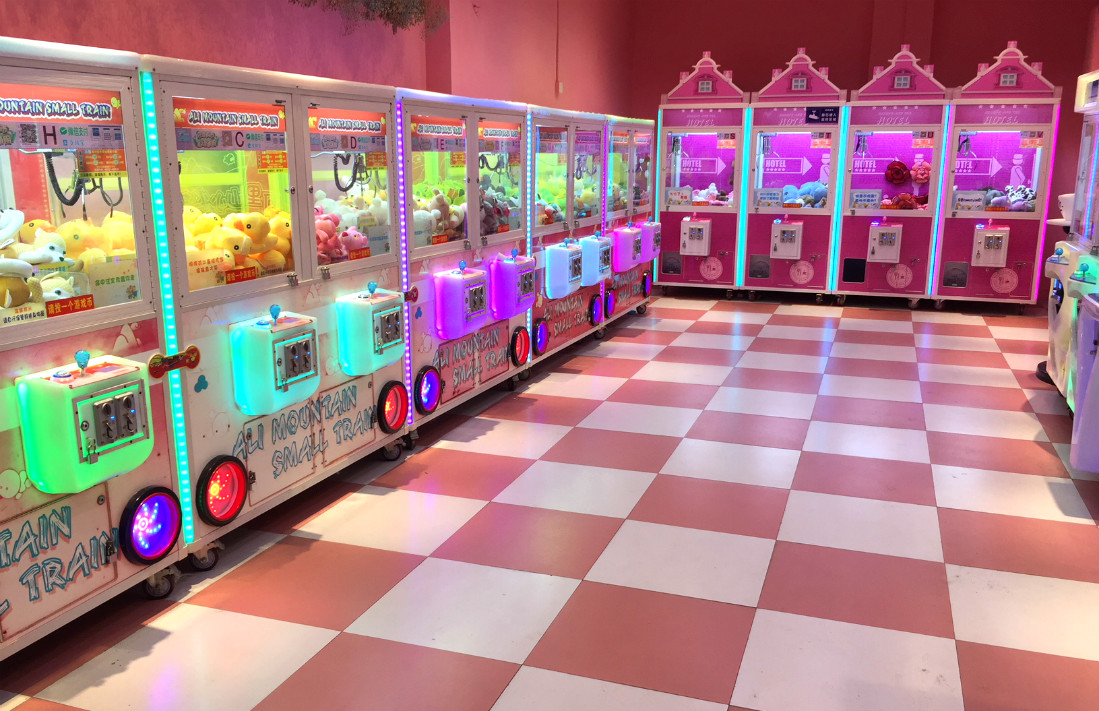 One day, the scores of young Chinese tourists that already favor revamped Sha Po Wei will move more freely and in greater numbers. One day, the Xiamenese might even return. “Local people don’t come here anymore,” Krings says. “You can’t get a taxi. You can’t drive here because you can’t park.”
One day, the scores of young Chinese tourists that already favor revamped Sha Po Wei will move more freely and in greater numbers. One day, the Xiamenese might even return. “Local people don’t come here anymore,” Krings says. “You can’t get a taxi. You can’t drive here because you can’t park.”
You also can’t drive there if your license plate number prohibits it. Traffic is so congested, and space so limited in and around Sha Po Wei, that locals wishing to actually brave this fuckery in their own vehicle can only do so on specific days. That is, if the last number on your plate is an odd number, you’re only allowed in on Monday, Wednesday, Friday, and Sunday; even-numbered cars are granted passage the other days.
If you gotta blame it all on something, don’t blame it on the rain or the stars that didn’t shine on this old fishing port—blame it on Krings. On the other hand, if it wasn’t for Krings and his beer, the entire neighborhood may have been razed to the ground.
Related: At Bionic Brew, That Which Does Not Kill You Makes You Stronger
“One day, after we were open for perhaps six months, the people that later developed Sha Po Wei Art Zone and some other places called and asked if we could open the next morning at like 8 o’clock because some important people would be coming. Okay, no problem,” Krings says.
“The next day a big golden bus pulls up with lots of police cars, and then the boss of Fujian Province and others step out and come into our bar. They were very happy drinking our beer,” he continues. “Some months later they opened this area, and when one of the designers gave a speech he said that the day the government officials came here they all went to Fat Fat Beer Horse to drink beer. That was the day, he said, that the government decided not to tear down this whole area and build skyscrapers because they very much liked the beer.”
Birth of the Beer Horse
At roughly the same time in life that I was occasionally blistering myself in pre-decent Detroit at underground raves in seedy warehouses, David Krings was pretty much doing the same thing in pre-gentrified Berlin. I know this because when you meet somebody to talk about beer, sometimes after a few beers you end up not talking about beer at all.
It’s easy to picture him some 20 years ago, swaying trance-like to grimy drum ‘n’ bass in some unmarked, dimly lit basement club, in part because you can briefly see modern-day Krings doing something like that in the first 30 seconds of the trailer for La Substància, a little-known 2016 indie film directed and co-written by Lluís Galter. Galter shot some of the movie in Xiamen (pronounced like “shamen”), and Krings kind of fell into a minor role in it.
I’m pretty sure Krings’ acting career isn’t going anywhere, but over the past decade or so the 40-year-old German has had a knack for falling into things that, in turn, have become things of even greater importance. He somewhat randomly wrote his master’s degree thesis in Xiamen, for instance, because Amsterdam’s Sandberg Instituut, where he earned a masters in design, works with the School of Arts at Xiamen University. Not long after graduating in 2011, Krings returned to Xiamen to work as a designer at Studio Ma Wen and lecturer at the university.
The results were mixed.
“I didn’t like [lecturing]. In the Netherlands I learned to search for your own problem, and then find a way to solve the problem you found. Here it was more like they wanted a blueprint on how to design, and I cannot do that for them,” he says. “For me it was always working out of material, trying to go as far as possible with a certain material or certain idea—just much more conceptual—and this didn’t work so well there. It was quite good at the design company, though, and I enjoyed it a lot. But then I had to make a decision about making beer or doing that.”
I didn’t leave out the part about Krings also training to be a professional brewer because it never happened. Brewing was something he started doing on the side, and before long one thing led to another and he kind of fell into the world’s biggest beer market.
Related: In Shanghai, Jackie’s Beer Nest is One in a Billion
“We started very unprofessionally, without much knowledge, and now we ended up in this crazy industry when we didn’t really want to get in it,” says Krings. “I didn’t know anything about craft beer when we started; I wanted to make Belgian beers. We had to go to Hong Kong to open our company, and that’s where I started drinking IPAs and stuff like that, and then everything went very fast. We brewed the first beer in January 2013, in May we opened the first 100-liter brewery, in September a self-built 400-liter brewery in a small place, and then another year later we opened here.”
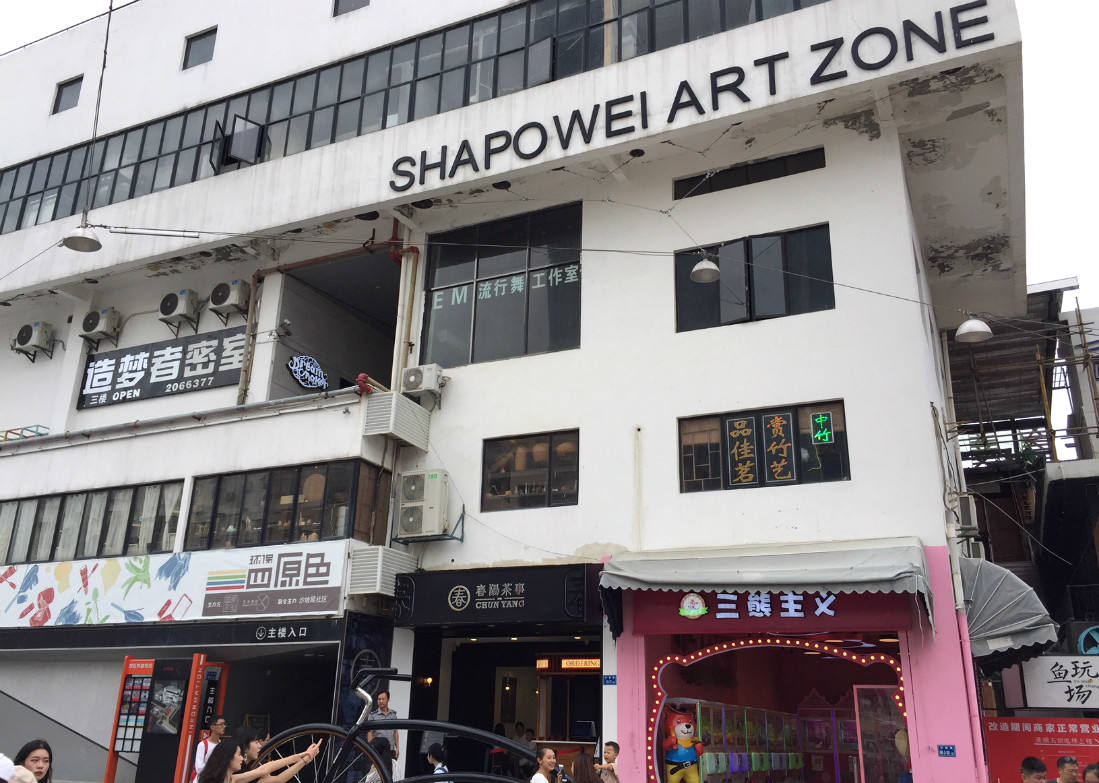
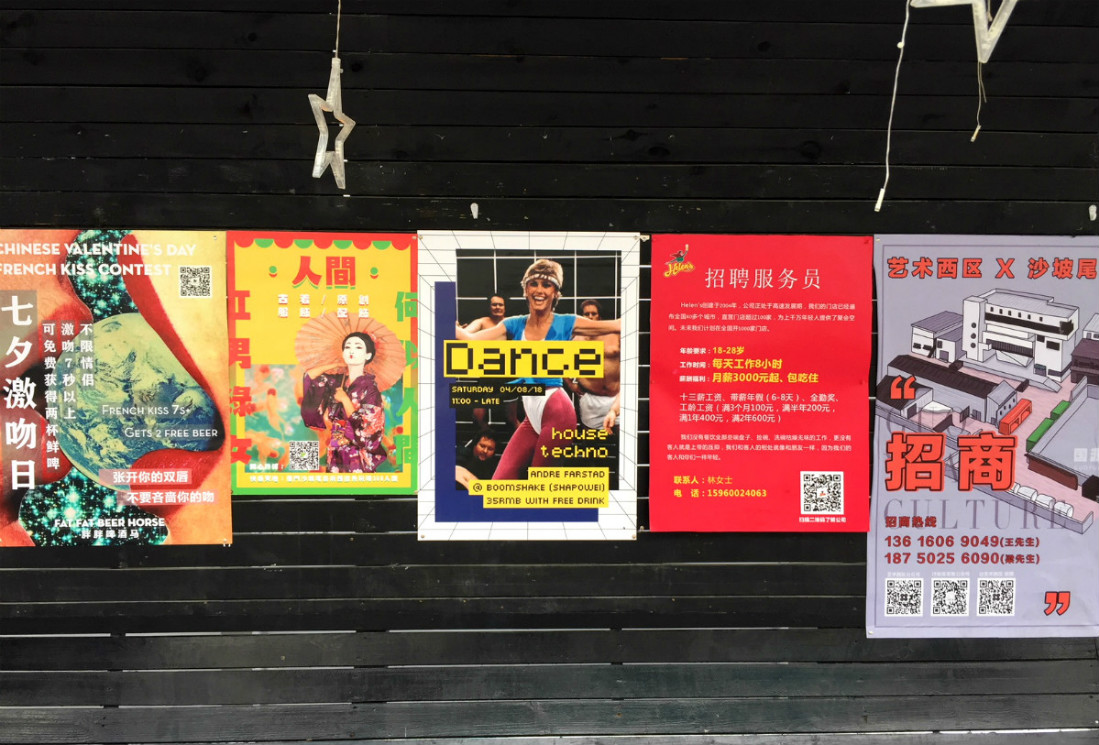
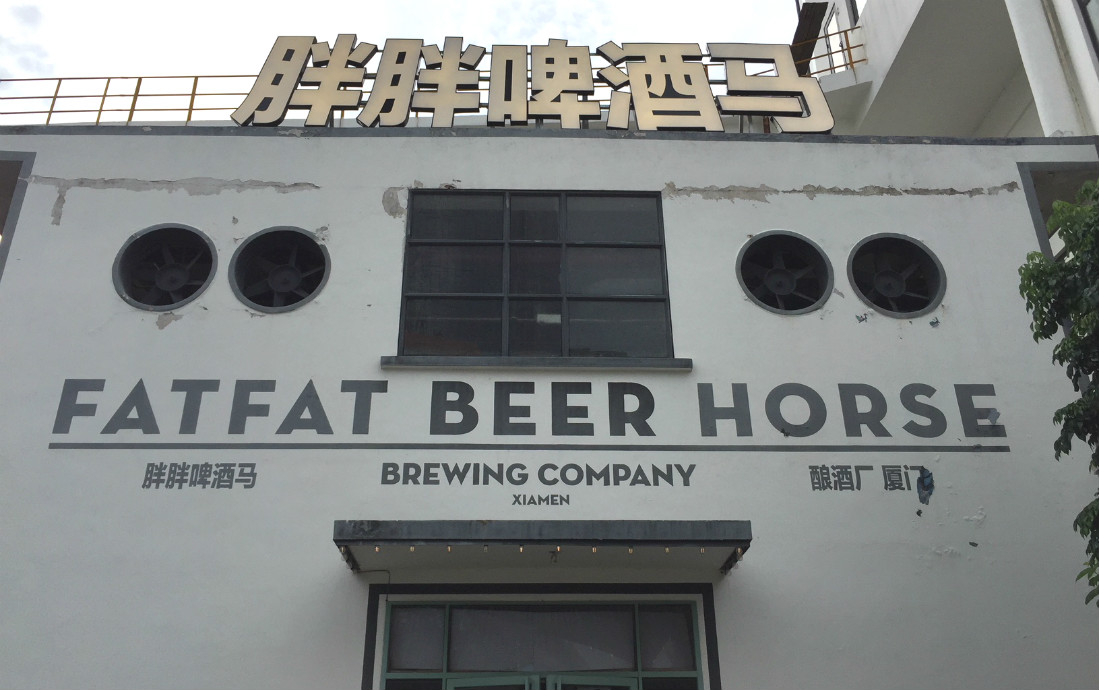
“Here” is a prime space in an old refrigeration plant repurposed in 2014 into the Art Zone. In Fat Fat Beer Horse’s ground-floor tasting room, tables are set on top of huge engines still connected to substantial pipes and gears that once powered the plant’s massive ice compressors. From the brewery’s rooftop deck you can actually see the conveyor belt upon which the ice blocks used to travel out of the plant and into the port to be loaded onto fishing boats.
Back on the main floor, next to the tap wall, is the Brewers Tank of Honor, a concrete tank scrawled with signatures from visiting brewers allowed to sign after meeting the following two criteria: They must be professional and have gotten drunk with Krings at the brewery.
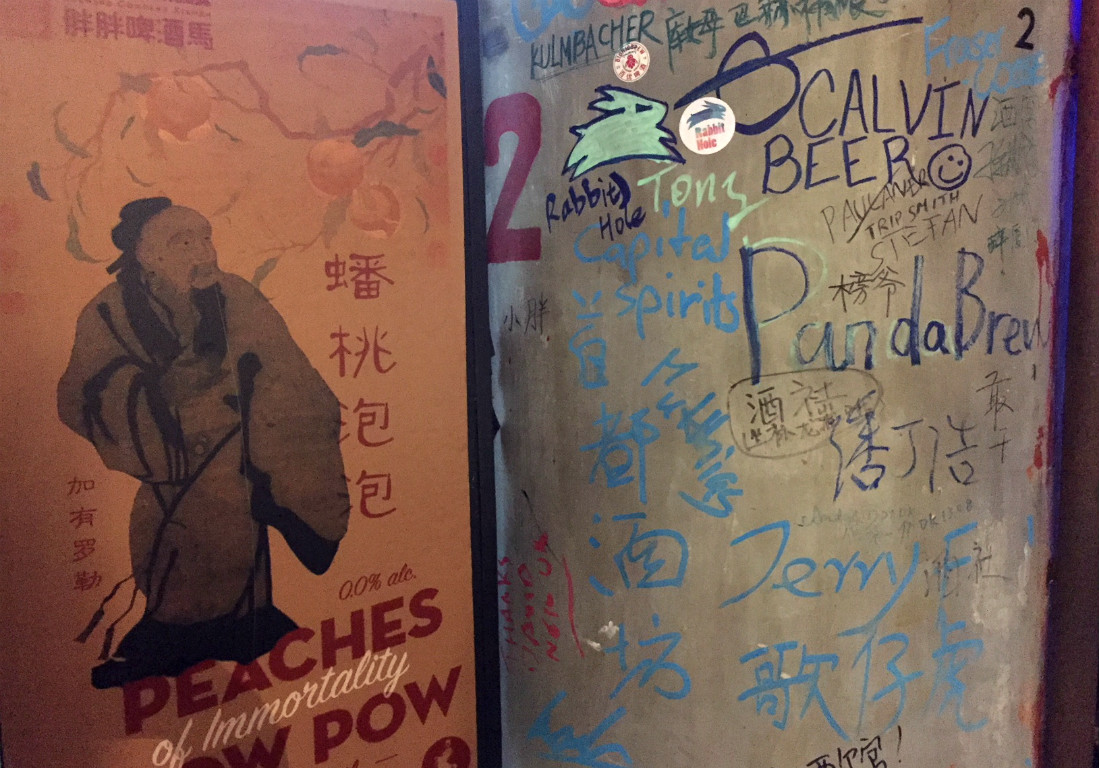
The brewery itself—the 500-liter brewhouse, the six 500-liter tanks, the cold room, a small gin distillery—is jammed into makeshift spaces here and there across three connected floors accessed from the back of the tasting room. Krings basically set everything up wherever it was possible to do so. I’ve never seen a setup quite like it, but to go back to Krings’ design background, it looks and sounds like he’s taken this particular idea as far as he can take it.
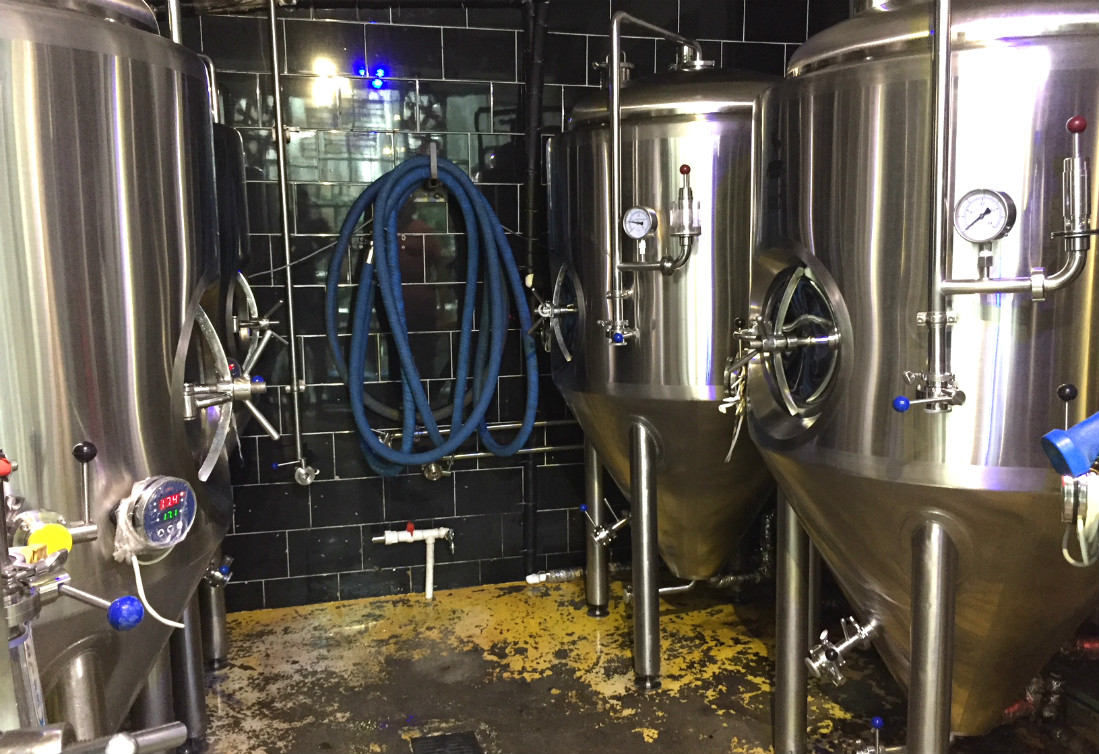
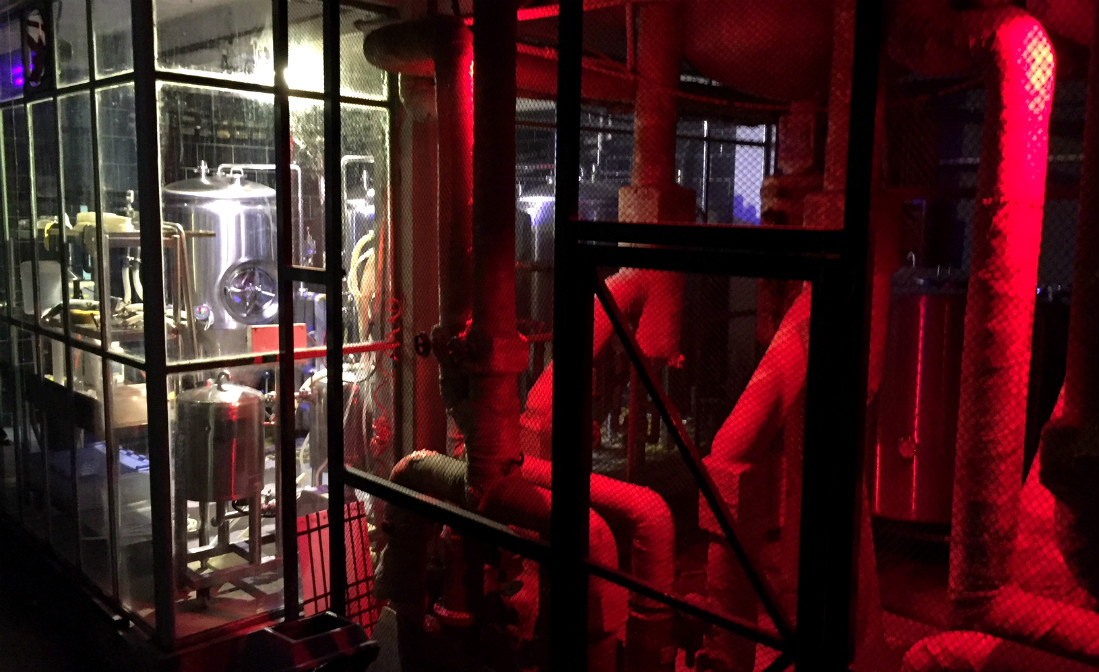
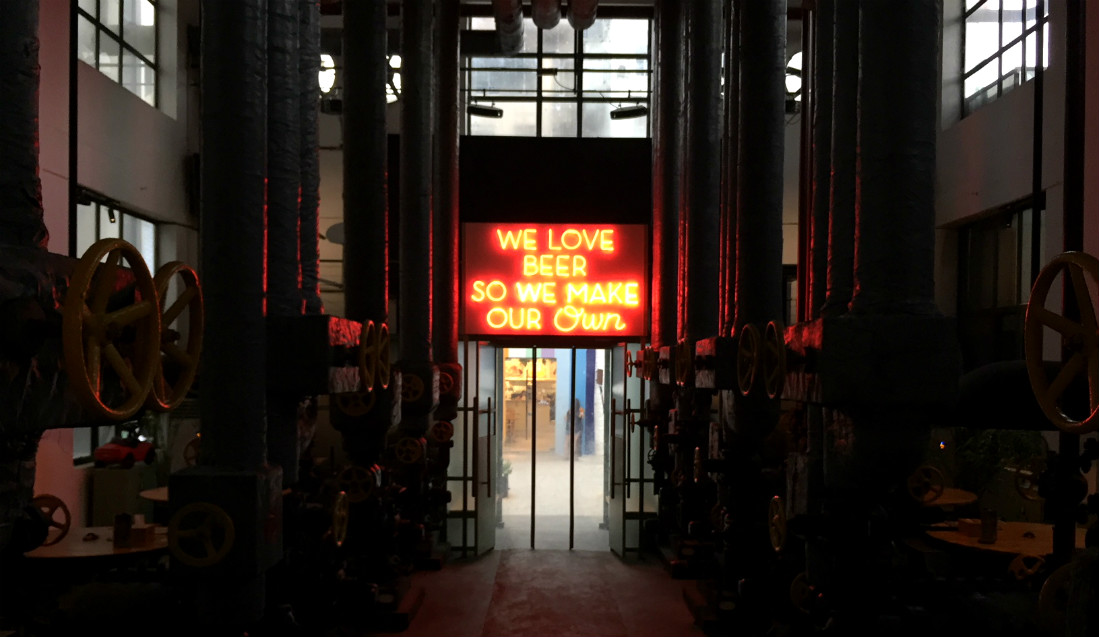
“This space was very good for us, but I don’t know if I would rent it again with the knowledge I have now. We don’t have so much room, and we have all these old tanks and pipes and other things we’re not allowed to take out, so I can’t extend our brewing capacity,” Krings says. “There are like 98 steps going up and down, and I do them like 20 to 30 times a day. We have to move out.”
At least it’s a good workout, right? “It’s not working,” Krings says as he smiles and rubs his belly.
This might be the appropriate place to explain the brewery’s rather unique name. Krings’ wife, whom he met in Xiamen, sometimes calls him “fat fat,” his Chinese zodiac sign is the horse, and, well, it’s a brewery.
Voila—Fat Fat Beer Horse. And for the record, David Krings isn’t fat.
The Taste of Xiamen
As a group of young girls take selfies in front of Fat Fat Beer Horse’s tap wall, Krings pours a few glasses of Mango Reef, a hazy 7% ABV milkshake IPA brewed with mango puree and lactose. I think it turned out beautifully, hitting all the right notes one would hope for and expect from a beer like this. Krings likes it too, but admits it’s not quite right for his audience, which he estimates is 95-percent Chinese.
“The first batch was great. I added lactose and mango puree after fermentation in that one, so it was very sweet and people loved it a lot,” he says. “For this one I added lactose during the boil and… it’s nice, but for our customer it’s too bitter. The first batch sold out in less than a month, and this one is already going on two months.”
Therein lies the challenge for Krings, who in Xiamen doesn’t have the same type of baked-in, bedrock Western expat crowd upon which craft breweries in places like Beijing, Shanghai, and even Guangzhou can draw. Oh, he’s perfectly fine with serving a predominantly Chinese clientele here—strongly prefers it, in fact—but finding a common ground between his beer palate, the local beer palate, and his ideas about which types of beers and flavors will resonate with that local palate is an ongoing education.
Take, for instance, an early lesson learned when he set out to make a beer that reflected “the taste of Xiamen.”
“The first customers we had were local people—fishermen—and I was very proud that I had Yang Mei, a fruity wit beer. We wanted to be this local brewery using local ingredients, and we kind of said here, this is a local beer, the taste of Xiamen,” Krings says. “But then I had Black Moon, which I brewed using a lot of things I found in the market. It was one of those beers you do when you don’t know anything about brewing, and when you just think brewing is so amazing and easy. It had some Chinese medicinal qualities and, like, soya sauce, and when the locals tried it they were like no, this is the taste of Xiamen. It was very bitter, very strong, and they could connect it to something else.”
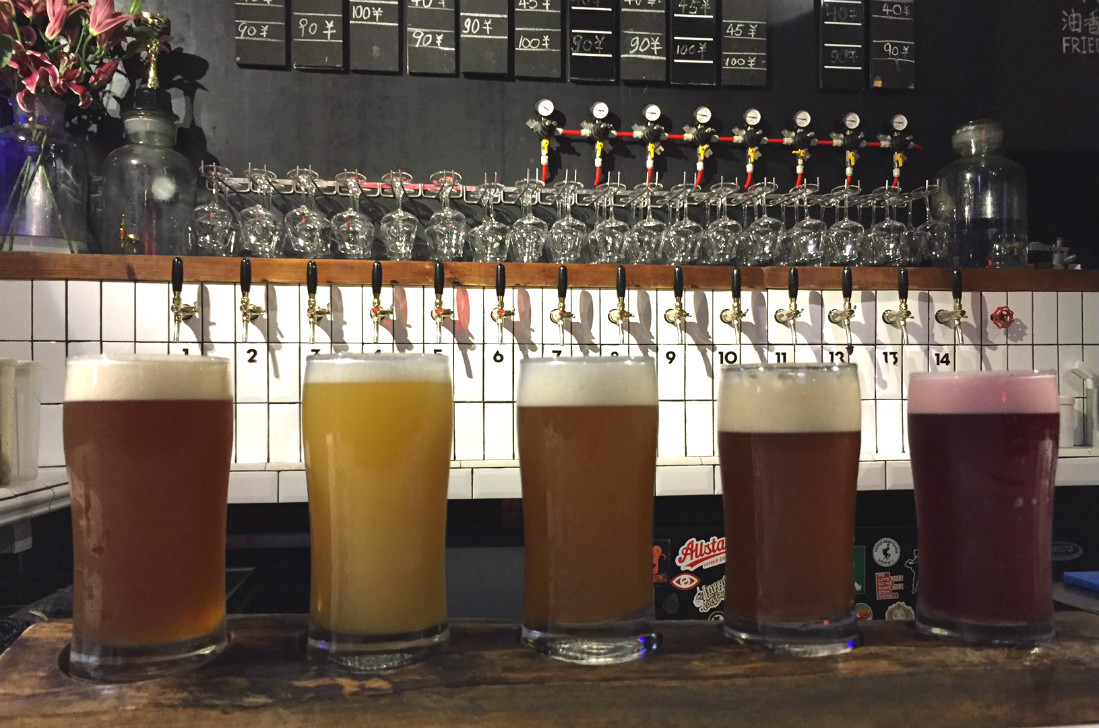
Krings doesn’t brew Black Moon anymore (“It’s a hazard”), but when I visit Yang Mei is one of 10 beers and two ciders on tap, a lineup that includes Seven Horses (double IPA), Brabander (Belgian pale ale), and Goldener Reiter, a clean and grassy Helles lager of which, perhaps more than any other beer on the menu that day, Krings seems to be most proud. “All these hoppy things, to be honest, they’re a trend. I’d like to create a special thing from here, from Xiamen,” he says. “In that sense I’m quite German, because in Germany we have cities that have their own beer. This is the direction I’d like to go. The long-term dream would be to make more wheat beers, but right now I don’t have time or space to dig into that.”
He will soon.
Fujian or Bust
Things are moving fast again.
Later this year in nearby Quanzhou, Fat Fat Beer Horse will open a new 14-tap bar located in an old paper factory. Construction is underway, as well, on a new 3,000 sqm brewery just across the bay from Sha Po Wei that will house a new 2,500-liter brewhouse and enough tanks to accommodate up to 500,000 liters annually—and that’s apparently just the first stage. (For context, Krings estimates that he’s currently moving about 30,000 liters a year.) A new 600-liter distillery for gin and absinthe is coming, too. Krings hopes to have the facility up and running shortly after Chinese New Year 2019.
It’s clearly another big step, but Krings doesn’t sound like a guy who with this move is eyeing country-wide domination. For now he has no interest in bottling or canning, and for now he wants to keep it local which, you know, isn’t exactly settling for a small hill of beans when you’re in a province with a population pushing 40 million.
“I very often have to question myself on things like bottling. Of course it looks nice, and I would be very proud to have [bottles], but in the end I know I don’t want to do it,” he says. “I’m not waiting to produce and sell all over China. I would prefer to see a lot of nice small places that make beer. I don’t believe in importing; it’s a little bit stupid. The beer is great, of course, and you have this image of being the good guys, but then you send your garbage all over the world.”
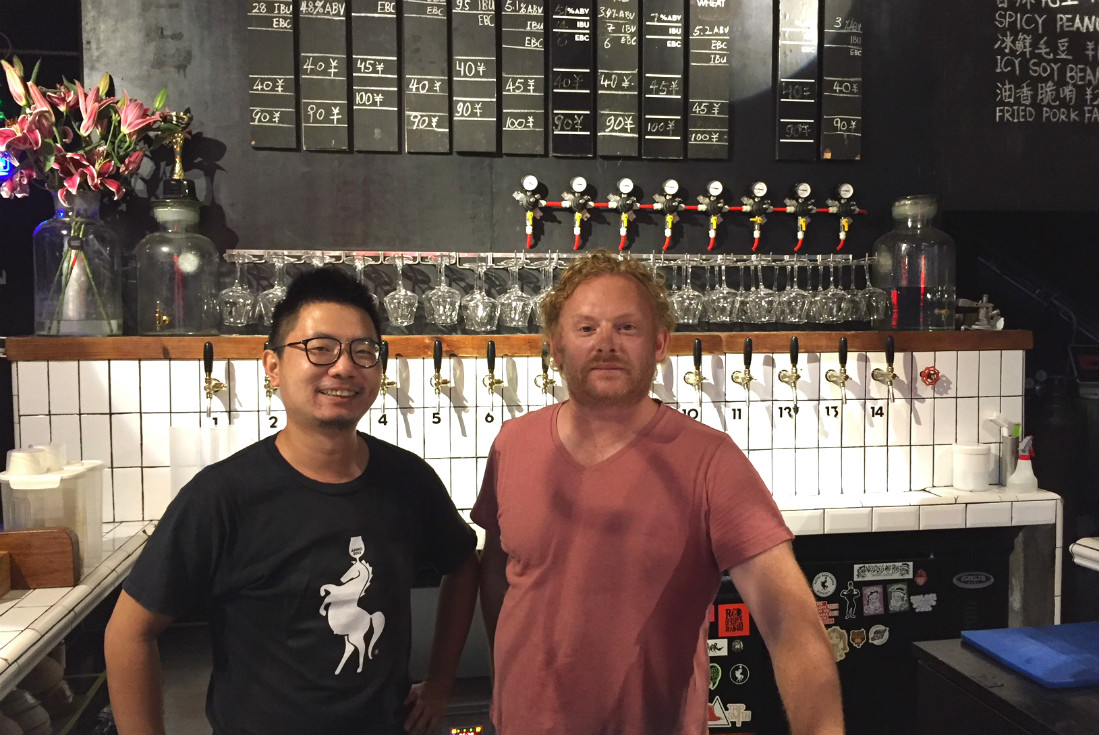
No bottling, exporting, or thoughts of grandeur—listening to Krings discuss his vision for the brewery (and fears about it), and how that vision may differ from that of other established craft breweries in China, I can’t help but recall David Lynch’s amusing story about the time he met with George Lucas to discuss directing Return of the Jedi. Lynch says he got a progressively worse headache as Lucas described his grandiose plans for the film, and that despite leaving “I don’t know how many millions of dollars” on the table after turning it down, he knew he just couldn’t go down that road.
“We are doing this new brewery to support our own shops, and what we don’t sell at our own shops we will retail to other bars in Fujian,” Krings says. “I like how in places like Belgium, and in America, you have these farmhouse-style breweries that are very local. I think that’s beautiful.”
###
Fat Fat Beer Horse is located in Sha Po Wei Art Zone in Xiamen, China. +86 187 5023 0350. Open Monday to Friday 6pm – 1am, Saturday & Sunday 2pm – 1am.
We wrote this story to the sounds of RJD2, jungle/drum ‘n’ bass, and a little Milli Vanilli.
Disclosure: Fat Fat Beer Horse kindly bought us a few beers. While that hasn’t influenced this story whatsoever, we believe in the old-fashioned thing called transparency.


